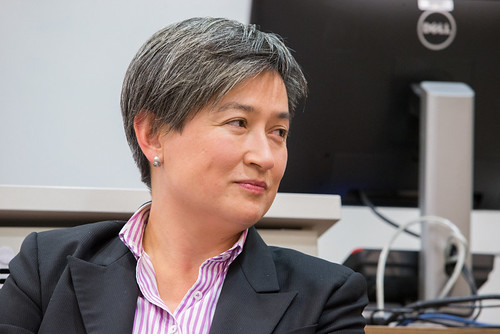How Anthony Albanese and Penny Wong are using Israel to ‘curry favour’ with Labor’s far left and quell fierce backlash against AUKUS
Penny Wong #PennyWong

Australia’s support for Israel is something of which we should all be proud.
We were there at the foundation of Israel 75 years ago, supporting the 1947 UN resolution that led to Israel’s establishment the next year.
Support for Israel then was bipartisan, with Labor hero and Foreign Minister H.V (Doc) Evatt presiding over the 1949 General Assembly vote admitting Israel as a UN member state, and then-opposition leader Robert Menzies reflecting that Israel’s creation was “a shining symbol of delivery from bondage, and (I believe) of world repentance”.
That is why the decision of the Albanese Government to change its recognition of the West Bank, which includes the sacred Jewish sites of the Temple Mount and Western Wall in East Jerusalem, to “occupied Palestinian Territory” represents such a sad departure from our long and strong history of bipartisan support for the Middle East’s only democracy.
Support for Israel should not be subject to the vagaries of Australian domestic politics.
It is something that represents our fundamental values and sense of history: our commitment to liberal democracy, human rights, and a recognition of the suffering of the Jewish people during the Holocaust that we must never allow to happen again.
A realist might say the impact of the Australian Labor Government’s announcement on Israel is minor.
Australia’s stance will hardly kick start the stalled peace negotiations between the Israelis and the Palestinians, nor have an impact on final status issues.
But it leads us to the conclusion that the real reason for this decision is pure politics, both for internal Labor party political reasons and United Nations politics.
The sad fact is the ALP leadership of Albanese and Wong has sacrificed longstanding bipartisan support for Israel to curry favour with the left factions in the ALP who might cause trouble when it comes to AUKUS.
Israel has become the quid pro quo for the alliance.
The ALP’s draft platform at this week’s conference says it “supports the recognition and right of Israel and Palestine to exist as two states within secure and recognised borders”, and “calls on the Australian government to recognise Palestine as a state” as “an important priority for the Australian government.”
What is the timeframe for this recognition especially as it is “an important priority”, and will recognition precede a settlement between Israel and Palestine?
If it does, then the Labor Government is clearly picking sides (and not Israel’s) and prejudging the final status of the borders.
Australia has been an outlier in its international support for Israel.
It is lonely at the United Nations, being one of a handful of countries voting against resolution after resolution condemning Israel.
Internal party politics aside, Australia’s shifting position also presents as virtue-signalling – we are shifting away from our shared position with our long-time ally – the US – to side instead with the EU and most UN member states.
This shift is convenient timing when it comes to positioning for key UN ballots.
Australia’s Judge on the International Court of Justice, Hilary Charlesworth, for example, is up for re-election later this year.
The ICJ has been asked to give an Advisory Opinion on Israel’s settlements in the West Bank.
If most votes at the UN side with the Palestinians, it is helpful for Charlesworth’s re-election chances to point to her government’s hardening position on Israel.
Throughout the 16 years of the Menzies Government, Australia took a strong pro-Israel position, defending Israel’s invasion of the Sinai in 1956 as a justified act of self-defence in the face of many years of aggression on the part of Israel’s Arab neighbours.
It was not until the election of the first Labor Government in 23 years, that of Gough Whitlam in 1972, that Australia began to cool on Israel and the issue began to be raised at ALP National Conferences.
The governments of both Bob Hawke and John Howard were resolute supporters of Israel, but the influence of figures such as former Foreign Ministers Bob Carr and Gareth Evans have led a shift within Labor away from Israel.
They have got their way, for now.
What next?
Georgina is a lawyer, former diplomat and the CEO of the Robert Menzies Institute. She brings a wealth of international experience from her time with the Department of Foreign Affairs and Trade and the International Republican Institute.